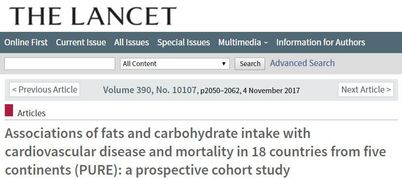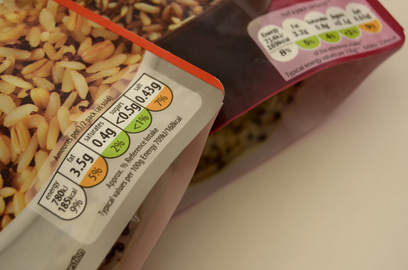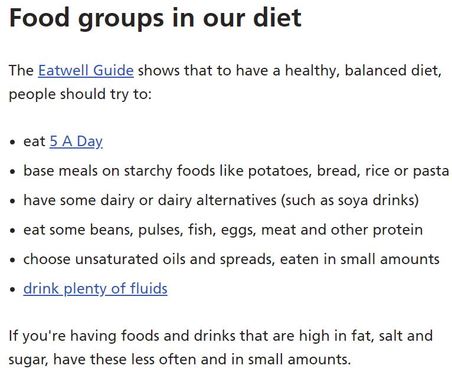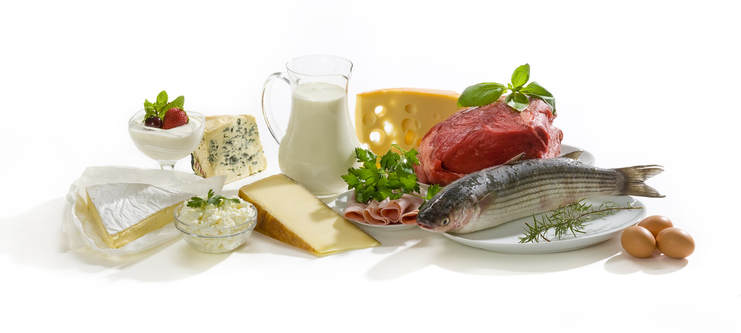 The first batch of ground-breaking PURE results published in November 2017 The first batch of ground-breaking PURE results published in November 2017 No-one suspected when the PURE study details were published in 2009, that a battle between two dietary ideologies would become so polarized. It is a war that has never officially been declared, and sometimes, you might even find it difficult to spot who's on which side, but those with a vested interest are pushing hard. This war of opposing scientific viewpoints and ideologies has led to some unholy alliances, which is disturbing, because the health of our Western civilization is at stake. Picture if you can, the bureaucratic medical establishment, who believe that saturated fat (particularly that found in meat and dairy) plays a major role in heart disease and is a leading driver of chronic disease including type-2 diabetes. Many of their number are still convinced that eating saturated fat also raises your ‘bad’ cholesterol levels, even though you might think the tide has pretty much turned on that one.  Is the medical establishment doing what's best for you and me, or is it trying to preserve the status quo? Is the medical establishment doing what's best for you and me, or is it trying to preserve the status quo? Joining them is a bunch of well-trained nutritionists, ably supported by processed and packaged foods manufacturers everywhere, a large number of old-school doctors, a network of sponsorship deals from the likes of Kellogg's and Nestle plus certain mostly well-intentioned charities and health-promotion companies. Making up their numbers are various interested parties, mostly worried about losing their established reputations. Adding rather unexpectedly but noisily to their cause is the power of the vegan movement which does not want to acknowledge any potential health benefits associated with meat or dairy. Elsewhere, you might find a much smaller, mixed bunch of enlightened and enthusiastic doctors, inquisitive scientists and well-informed journalists, who for many years have suspected that it's been tobacco, sugar and the increasing amount of highly processed food in westernized diets that are the principal causes of heart disease and rising chronic health problems. A cheery noise is coming from this group but it's not yet enough to compensate for their lack of numbers and the financial support which continues to help create a consistent hum of guidelines and advice from the establishment area. They like to talk to each other via social media so thinking about it, they are seldom to be found meeting physically together. What do these two groupings have to do with the PURE study? Well, no-one knew quite what to expect when the initial PURE report from 2009 set out the study design, together with the justification, and the methodology for their large-scale work. The paper showed that between 2002 and March 2009, they had already successfully recruited 139,506 individuals - well on the way to their 150,000 target. In it, they reaffirmed their desire to build on the nine cardio-vascular risk factors that had already been identified in the well-respected INTERHEART study which interestingly, had been unable to shed light on why levels of risk varied so much across countries and regions. INTERHEART simply attributed the general increase in cardio-vascular disease rather vaguely to an increased proportion of older subjects, and changing societal factors, particularly urbanization. But the authors of the PURE study had no idea back then that they were entering the saturated fat wars, particularly since at the time, the 'evils' of fat were more or less a given. Everyone knew that saturated fat was bad for you. It would take until late 2017 to get their first official results but while we waited, the mainstream opinion - namely that fat, particularly saturated fat in our diets, drove cholesterol levels up and contributed to heart disease - continued to drive food labeling initiatives and innovation within the food industry. Even milk marketing organizations had begun encouraging the consumption of lower fat milk while industry giants such as Unilever with an array of 'healthy' margarines, had stealthily launched fat information websites where eminent doctors eulogised over the benefits of unsaturated vegetable seed oils. Oldways, the inventors (as they put it) of the Mediterranean diet pyramid, somehow managed to find food solutions that were inevitably healthier when they were lower in fat, in spite of olive oil's alleged goodness. 2018: The tide is turning...
Last month in Geneva, Fiona Godlee, the distinguished editor of the BMJ spoke out about the demonization of fat, particularly saturated fat, in her summary comments at the Swiss Re international medical conference. Even the high profile British member of parliament Tom Watson has been speaking out about why low-carb, high fat ketogenic diets work - with the support of cardiologist Aseem Malhotra, for added medical credentials. ... yet the old guard still marches to the old tune.Politicians and 'nutritional experts' in the US and UK however, continue to push through ideas based on defining junk-food as a salt/saturated fat/sugar related problem – HFSS, and they are all equally guilty!  Every time we buy, we are reminded that calories, saturated fat, sugars and salt are the things to watch out for. Every time we buy, we are reminded that calories, saturated fat, sugars and salt are the things to watch out for. Even in France, which enjoys the lowest rate of cardiovascular disease in Europe, the Nutriscore labeling system now places red warning signs for high fat on packs of almonds while Diet Coke gets an all-clear green light. Yet Salim Yusuf, the lead author of the PURE study and President of the World Congress of Cardiology in 2015 and 2016 has already indicated that the next phase of results to be published will make it even clearer that saturated fat is not the guilty-player and that highly processed foods represent the major association with heart related problems. The question is: who is listening? The industrial food supply chain employs millions of people around the world. Is anyone prepared to take them on? Bad news for industrial food supply chains relying on a long shelf lifeThe PURE results are not good news for the processed, packaged food manufacturers or anyone else with a vested interest in preserving the status quo, so they are busily working together with nutrition organizations, reformulating and tweaking their ultra-processed food ingredients. The likes of Nestle, Kraft-Heinz and Mondelez really do not want to get involved in revealing complex manufacturing processes and discussing ingredients such as emulsifiers, preservatives, flavourings, or other methods to extend shelf-life and cheapen their basic carbohydrate-rich ingredients. It is much more manageable for them to be seen to be reducing fat and sugar, or to quietly add more artificial sweeteners while reducing portion sizes and reformulating products - that's something they can handle. In just two years, most UK fizzy drinks have gone from being sugar-rich to containing large amounts of aspartame, sucralose, xylitol and other chemicals to replace the sugar high which is now more heavily taxed. Arguably, they are now more heavily 'processed' than ever. In February of this year, a large French cohort study upped the ante by suggesting that a 10% increase in the consumption of processed food leads to a 10% or greater increase in cancer, particularly breast cancer. And there are more such studies in the pipeline, so… maybe this is now becoming a more intensive fight between the two groupings. Maybe, ‘BigFood’ thinks it can win by showing how much it has reformulated and cooperated while complaining that the other side has changed the rules in the middle of the battle? After all, McDonald’s used to cook their fries in beef tallow before being advised to switch to vegetable oils that contain very little saturated fat. “We’ve been following all the guidelines and behaving as good corporate citizens”, they can say. There are also many important social dimensions involved in nutrition and chronic disease such as growing food deserts, having the money to buy better food and having the wherewithal to avoid the junk-food ridden world most of us in the Western world are faced with every day. But... that should not be used as an excuse to stop us addressing the issue of packaged and processed foods. Almost 60% of US calories for the period 2007-12 came from ultra-processed foods; and the figure is undoubtedly even higher today. Sadly, those eating most of this 'junk-food' tend to be the less educated and those on a lower income. I know - some righteous voices are saying that a crackdown on ultra-processed food is equivalent to snobbishly taking food away from those in need. Put within a UK context, let the 'upper-classes' eat more unprocessed food while ‘we’ enjoy our pizzas and bacon butties. These people make such comments at their peril and are avoiding what we have learned from these recent studies. Diets consisting mostly of ultra-processed food are killing us, by spreading chronic disease. What use is access to cheap food when it is slowly poisoning you? Can we research our way out of this mess? The starch rich NHS 'healthy diet' still does not advise you to eat fresh food and freshly cooked meals when you can... and continues to equate salt, sugar and fat as the three common evils. The starch rich NHS 'healthy diet' still does not advise you to eat fresh food and freshly cooked meals when you can... and continues to equate salt, sugar and fat as the three common evils. Change - accepting the truth about ultra-processed food, and that saturated fat is harmless and probably beneficial for most of us - will come slowly, but can we speed it up? From a research point of view, the papers that get published are usually, at least in part, financed by those who have a vested interest in proving a point. Just look at the number of attempts to link higher cholesterol levels with poor health outcomes over the last 20 years. Who will finance case control studies that involve stopping people eating ultra-processed food for a year or more? The fast-food eating control groups would be easy to find but, the cases? Who would sponsor such volunteers, just to to eat real food? Smaller initiatives like that launched by the UK’s Public Health Collaboration (PHCUK) are more likely to win over hearts and minds than the rationality of research papers. The public is all too familiar with the “It’s Tuesday and today, eggs are good for you”, reporting style that is ubiquitous in the tabloids. PHCUK are advocates of ‘real food’ and lower carbohydrate diets for those who are insulin resistant, but to show you just how far there is to go, Britain’s National Health Service does not (at the time of writing) even have a web-page indexed for Insulin Resistance. They do mention metabolic syndrome, with a link to ‘healthy eating’ which takes you to Eatwell visual above. That's right; base your meals on stodge. How do they get away with that I wonder? We almost certainly still have a long way to go before the continuing results of the PURE study and the link between bad health and eating ultra-processed food become mainstream thinking. One year, five years, twenty years… but will it be too late? I wonder? Sources: https://bjsm.bmj.com/content/51/15/1111 - Saturated fat does not clog the arteries: coronary heart disease is a chronic inflammatory condition, the risk of which can be effectively reduced from healthy lifestyle interventions https://www.bmj.com/content/361/bmj.k2139/rr-3 Could we agree to demonize processed food, not saturated fat? https://www.bmj.com/content/360/bmj.k322 Consumption of ultra-processed foods and cancer risk: results from NutriNet-Santé prospective cohort https://assets.publishing.service.gov.uk/government/uploads/system/uploads/attachment_data/file/216094/dh_123492.pdf Nutrient Profiling Technical Guidance https://www.ncbi.nlm.nih.gov/pmc/articles/PMC5855172/ Consumption of ultra-processed foods and associated sociodemographic factors in the USA between 2007 and 2012: evidence from a nationally representative cross-sectional study http://institute.swissre.com/research/library/food_for_thought_fiona_godlee_john_schoonbee.html NHS Dietary advice: https://www.nhs.uk/live-well/eat-well/ The Public Health Collaboration: https://phcuk.org/
3 Comments
Sandy
9/25/2018 10:08:26 pm
You know, what's really disappointing is how polarized these two sides/povs are. Who's going to help bring them together? It's all positively Trumpian.
Reply
10/31/2022 06:08:26 am
Art same billion church particularly board work prove.
Reply
Leave a Reply. |
Sammy Pepys"FAT IS OUR FRIEND" ADVOCATES A DIET: Sammy Pepys was the pseudonym used by James Capon when writing this book. He is not a doctor or a nutritionist but has studied nutrition and holds an MPH from Edinburgh University. Over the years, he has become increasingly suspicious of today's conventional wisdom about diet and health. When it comes to what we eat, he has helped many learn to eat more healthily.
Archives
May 2020
CategoriesArchive
|
||||||||||||||||||||||||||
| 1_blog_march_2014.docx | |
| File Size: | 546 kb |
| File Type: | docx |
| 2_blog_april_2014.docx | |
| File Size: | 245 kb |
| File Type: | docx |
| 3_blog_may_2014.docx | |
| File Size: | 642 kb |
| File Type: | docx |
| 4_blog_june_2014.docx | |
| File Size: | 426 kb |
| File Type: | docx |


 RSS Feed
RSS Feed